We often drink champagne to celebrate important events in our life, be it a New Year, a birthday party, or an anniversary. And if we’re celebrating these occasions with friends, we often need to buy an additional bottle or two, just in case. Plus getting a bottle of champagne as a gift isn’t that uncommon these days too.
And at a certain point, you realize you already have a few bottles of champagne stashed, and some of them are sitting in the cellar or pantry for a few years already. That’s when you start wondering if champagne can go bad, or how long does it last. Or whether it’s like good wine and gets better over time, or not.
As you might imagine, you’re not the only one who asks such questions. In this article, I gathered all the essential storage and shelf-life related facts and tips about this alcoholic drink. If you’re looking to learn more about the fizzy drink, read on.
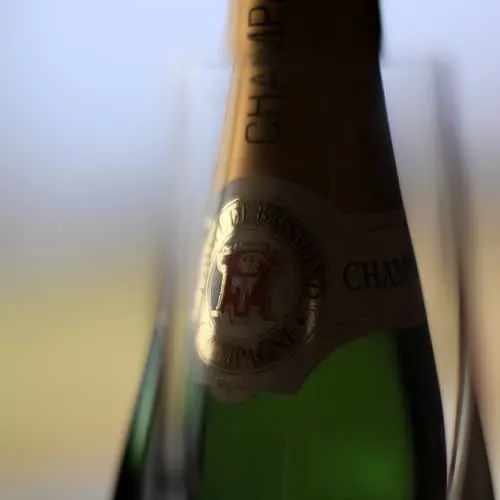
But before we start, let’s clarify one thing. We usually use the term champagne for pretty much all kinds of sparkling wine. Technically, “real” champagne must be made in the Champagne region in France, and it’s usually quite expensive.
So unless you have a bottle of Bollinger, Taittinger, Moet and Chandon, or another one of Champagne houses ([WIKI]), you probably have a bottle of sparkling wine. That’s okay. Truth be told, the difference is mostly technical, and there are many great sparkling wines out there from other countries and regions.
In this article, I use the term champagne loosely, so it covers even the cheapest stuff you can get in the supermarket (I don’t judge).
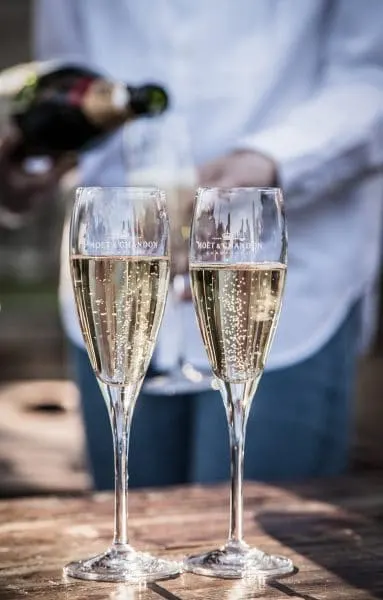
Can Champagne Go Bad? Does Champagne Go Bad After Opening?
Like all food products, champagne can go bad. But assuming that you do a decent job of storing an unopened bottle and it doesn’t have defects, it won’t go off for decades.
Please note that it doesn’t mean that the quality will be unchanged for that long. That only means it will be safe to drink, and probably at least resemble sparkling wine in taste. We will go through how long sparkling wine keeps quality in a bit.
Once you open the bottle of champagne, if you keep it sealed and refrigerated, it will easily last months in the fridge without going bad. And by going bad I mean becoming unsafe to drink, or making you sick after consuming a small amount.
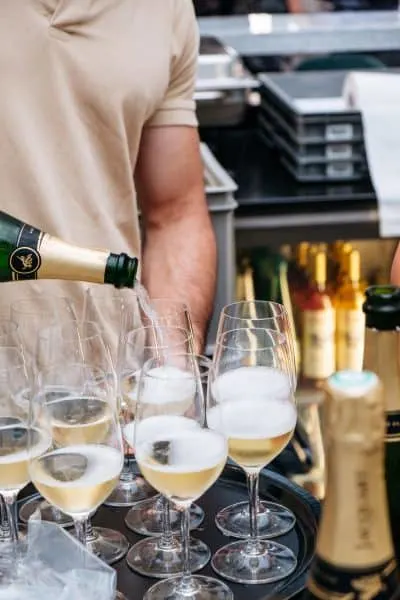
That, once again, doesn’t mean that the sparkling wine will still be good enough for drinking. But if you happen to drink some, the worst-case scenario is that you will find it awful and discard the rest.
In short, similarly to other alcoholic beverages, champagne is unlikely to go off. Unless you leave it unsealed for a long time, it should be just fine safety-wise.
But if you notice that the smell has changed or there’s something off about the taste, discard it. That hardly ever happens, but if it does, do the right thing and get rid of it.
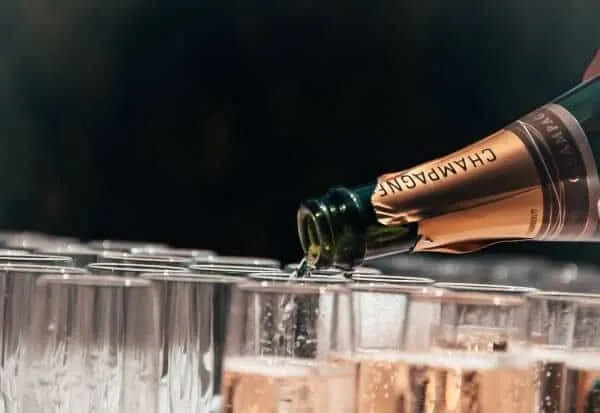
How Long Can You Keep An Unopened Bottle of Champagne?
Unfortunately, sparkling wine doesn’t last as long as hard liquors such as vodka or whiskey do.
But before we can discuss the shelf life of champagne, you need to know that there 2 types of champagnes out there: vintage and non-vintage ones.
The difference is super simple: vintage ones are made using grapes from a single year, while non-vintage ones are made of grapes from multiple years ([WIKI]).
How to tell if champagne is vintage? If it is, there will be a year on the label. Most champagnes aren’t from a single harvest year, so if you can’t find a number on the front label, yours is a non-vintage one.
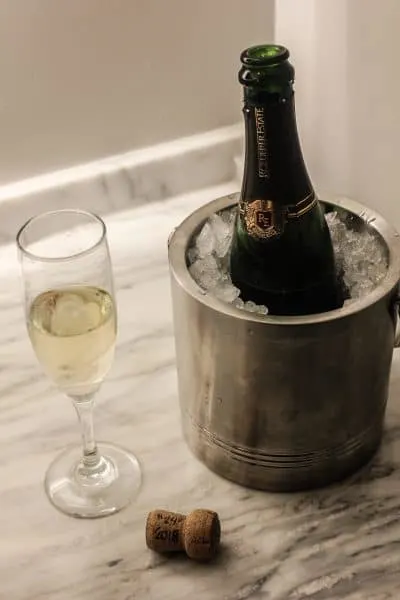
Why is this important? Vintage champagnes better retain quality over time. So if you own one of these, you can easily store it for many years. The better your storage conditions and the wine itself, the longer you can keep it, even up to 15 years ([PJ]).
For non-vintage ones, and less-expensive sparkling wines you get in the supermarket, it’s best to drink them as soon as there’s a good occasion.
That’s because they are at their best when fresh. Generally, it’s best to finish the bottle within about 5 years of bottling or less ([PJ]). That’s why sparkling wines often come with a best-by date that’s about 2 to 4 years from the bottling date.
Okay, so now you know how long various kinds of champagne should keep quality. What if the bottle that you own has passed that date?
Not that much, really. It just gradually loses some of its flavors. And there’s no way of telling when the alcoholic drink will taste so bad that you should throw it out. It’s up to you to open the bottle, give it a taste, and decide.
If it’s terrible, cut your loses and discard it. But leave that old bottle of champagne for a nightcap with your spouse, and get a fresh one for your birthday party.
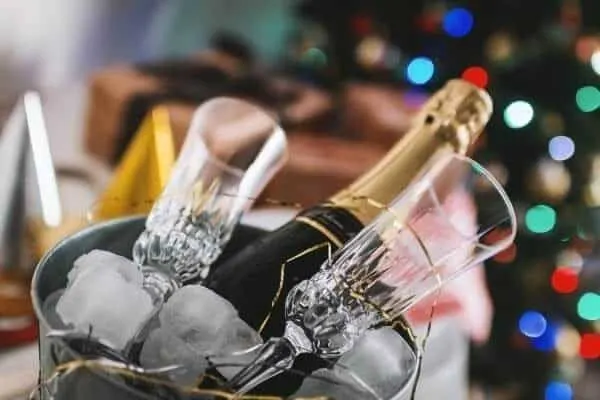
How Long Can You Keep Champagne in The Fridge After Opening?
While it’s best to finish the whole bottle the same day you open it, it’s not always feasible. If you’re not super into champagne, you probably won’t drink the entire thing with your spouse for your anniversary.
Fortunately enough, champagne can last a few days in the fridge and still keep some of its fizz and almost all of the taste.
Try to finish the bottle within like 3 to 5 days for best results, but I’ve had some sparkling wine in the fridge for over a week, and it still turned out pretty okay. Nothing that I would offer any guests or friends, but my wife and I enjoyed it alright.
The issue with sparkling wine is that after opening it inevitably starts to lose its carbonation. Precisely the same thing happens with sparkling water or soda. And most people don’t enjoy sparkling wine that’s not sparkly.
If you’re one of them, chances are that after the bottle sits a few days in the fridge, you will decide to throw out the rest after giving it a taste. If you don’t mind champagne that’s lost most of its fizz, you should find a bottle that’s been opened for a week quite okay.
Last but not least, the better you seal the bottle, the longer it will retain the bubbles. Speaking of which, let’s talk about storing champagne.
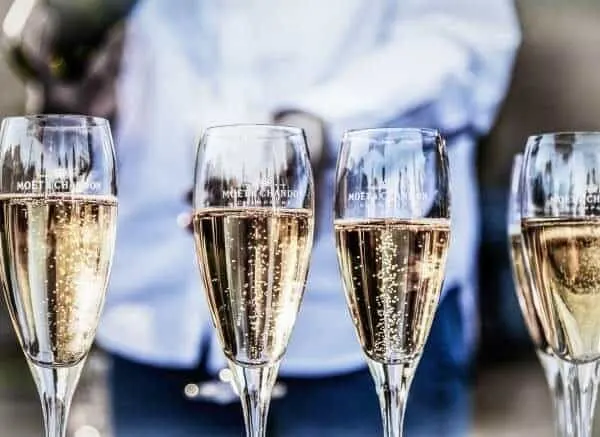
How To Store Champagne?
As long as the bottle is unopened, you should store it like any other wine. First and foremost, make sure it sits in a cool and dark place, away from any light sources.
While the perfect temperature for wine is between 53°F and 59°F (or 12° C and 15°C) ([PJ]), I wouldn’t worry about it that much unless you need to store a bottle of vintage champagne for many years. And if that’s the case, a wine cellar is something you should probably consider.
But if we’re talking about plain old inexpensive sparkling wine, room temperature in the pantry or cupboard in the kitchen is okay too. Just make sure it’s in a place where the temperature doesn’t change that often, as alcohol generally doesn’t respond well to regular temperature fluctuations.
If you have one of those more expensive champagnes, it probably has a wooden cork. If that’s the case, store the bottle horizontally if possible, so the cork stays moist and doesn’t deteriorate ([PC]). For bonus points make sure the place is somewhat humid, for the same reason.
The longer you plan on storing the champagne, the more important keeping the cork moist is. If you expect to open that bottle within a year or two, storing it vertically isn’t a big deal.
Of course, inexpensive sparkling wines usually come with a plastic cork, and you should keep them upright all the time. No fancy business here.
Okay, so you’ve opened the bottle but didn’t finish it. What now? Two things: seal it tightly and refrigerate. If possible, use the original cork. If you can’t fit it in, which is often the case for wooden bungs, use a champagne sealer, or pour the drink into a smaller bottle.
If neither one is an option, some aluminum wrap and a rubber band can make a reasonably good seal. It won’t be perfect, but you shouldn’t lose all the bubbles within a day or two.
In a Nutshell
- champagne (or sparkling wine), like other alcohols, don’t go bad easily
- once you open the bottle, the drink keeps the bubbles only for a few days, so hurry
- if you have a bottle of vintage champagne, you can store it for many years with great results, non-vintage and inexpensive ones are best if enjoyed fresh
- keep the unopened bottle in a dark and cool place, where the temperature doesn’t change
References
- [WIKI] Wikipedia: Champagne
- [PC] Premier Champagne: FAQ
- [PJ] PERRIER-JOUËT: FAQ